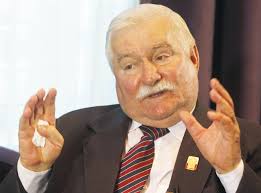 Lech Walesa, the legendary anti-communist leader who played a historic role in bringing down communism in Poland and across Eastern Europe, had served as a paid informant in the 1970s for the same communist regime that he later fought, according to documents revealed publicly Thursday.
Lech Walesa, the legendary anti-communist leader who played a historic role in bringing down communism in Poland and across Eastern Europe, had served as a paid informant in the 1970s for the same communist regime that he later fought, according to documents revealed publicly Thursday.
It is not yet clear how damaging the revelations will be to Walesa, who won the Nobel Peace Prize in 1983 for his defiant opposition to the communists and who became Poland’s first democratically-elected president after the 1989 fall of communism.
Walesa, now 72, has long admitted that he signed a document in the 1970s agreeing to provide information to the generally-hated communist secret police, although he insisted he never informed on anyone and never took any money. In 2000, he was cleared by a court, which said it found no evidence of collaboration.
On Thursday, Walesa suggested that the newly uncovered papers were fake and vowed to fight to clear his name.
“There can exist no documents coming from me,” Walesa said in a written message from Venezuela, where he is traveling. “I will prove that in court.”
Communism and strong controls by Moscow were imposed on Poland and other Eastern European nations after World War II — measures despised and opposed by most people in the region. The secret service was the regime’s harshest tool for keeping people under its control, using personal information to blackmail and discredit opponents and dissidents.
But the secret police also fabricated information on people, a fact that calls for meticulous confirmation of the authenticity of any compromising documents that emerge. The fate of the files was a major concern after the communists lost power in 1989, with reports saying that secret agents at the time were fabricating new documents and burning or hiding others.
The newly discovered evidence implicating Walesa was found among documents seized this week from the home of the last communist interior minister, the late Gen. Czeslaw Kiszczak, said Lukasz Kaminski, the head of the National Remembrance Institute, a state body that investigates Nazi and communist-era crimes.
Kaminski said they include a commitment to provide information that is signed with Walesa’s name and codename “Bolek.” There are also pages of reports and receipts for money, signed “Bolek,” and dated from 1970-76.
Kaminski said the 279 pages of documents on Walesa seem to be authentic and will be made public in due course. He said historians need time to analyze the content of the documents.
Antoni Dudek, the institute’s leading historian and an expert on Walesa, predicted that the impact would not be that great unless some evidence emerged that Walesa continued to be an informant after he had founded the Solidarity freedom movement in 1980.
“Lech Walesa is the symbol of Poland’s struggle for freedom. He is the symbol of Solidarity and nothing can destroy that, unless we learn that he continued that collaboration,” Dudek said.
The papers concerning Walesa came to light on Tuesday, when Kiszczak’s widow offered to sell the institute documents concerning secret informer “Bolek.” She demanded 90,000 zlotys ($23,000) for them. Prosecutors seized the documents the same day because the law requires that important historic or state papers be handed over to authorities.
According to Kaminski, the institute seized five more packets of documents but these have not yet been opened. Prosecutors and police also searched Kiszczak’s summer house on Thursday.
Walesa is the icon of Poland’s and Eastern Europe’s drive for freedom that abolished communism and brought down the Iron Curtain without bloodshed. He founded and led Solidarity from 1980, when it was born out of shipyard worker protests on the Baltic Sea coast, and through communist-imposed martial law. He led Solidarity in round-table negotiations with the communists, Kiszczak among them, in 1989 that ushered in massive democratic and economic changes.
Walesa was democratic Poland’s first popularly elected president from 1990 to 1995, but, following a term of office when his style was perceived as authoritarian, he painfully lost a re-election bid to ex-communist Aleksander Kwasniewski.
Walesa has withdrawn officially from politics, though he comments publicly on current events. He is a sharp critic of Poland’s new conservative ruling party, the Law and Justice party, whose leader, Jaroslaw Kaczynski, is a longtime political foe of Walesa’s.
Walesa has recently accused the new leadership of undermining democracy.
NY Times

Leave a Reply
You must be logged in to post a comment.